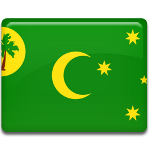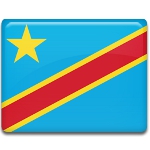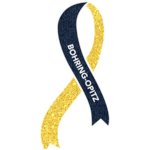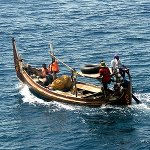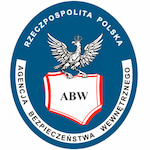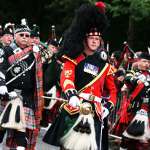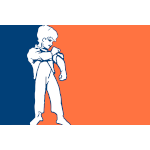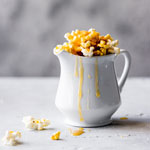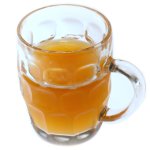Holidays Calendar for April 6, 2018
April 6 is a public holiday in Thailand known as Chakri Memorial Day or simply Chakri Day. It commemorates the establishment of the Chakri Dynasty that has been ruling the Kingdom of Thailand since 1782.
On April 6, Burundians celebrate President Ntaryamira Day. It is a public holiday that commemorates the anniversary of President Cyprien Ntaryamira's death in 1994.
Act of Self Determination Day is a public holidays in the Cocos (Keeling) Islands celebrated on April 6. On this day in 1984, the referendum of self-determination of the archipelago was held.
Kimbangu Day is a public holiday in the Democratic Republic of the Congo celebrated annually on April 6. It honors Simon Kimbangu, a prominent Congolese religious leader, and commemorates the anniversary of his first sermon.
Passover, also known as Pesach, is one of the most significant Jewish holidays. It commemorates the liberation of the Jewish people from slavery in ancient Egypt and the story of the Exodus. This festival commences on the 15th day of Nisan in the Hebrew calendar and lasts for seven days in Israel and for eight days in the diaspora.
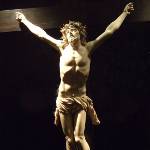 Religious Holidays →
Bosnia and Herzegovina,
Bulgaria,
Cyprus,
Georgia,
Greece,
Lebanon,
Romania,
Montenegro,
Serbia,
Sudan,
Eritrea,
Ethiopia
Religious Holidays →
Bosnia and Herzegovina,
Bulgaria,
Cyprus,
Georgia,
Greece,
Lebanon,
Romania,
Montenegro,
Serbia,
Sudan,
Eritrea,
Ethiopia
Good Friday in Eastern Christianity
Good Friday, also known as Great Friday and Holy Friday, is a Christian feast that commemorates the crucifixion of Jesus Christ and his death at Golgotha. It is celebrated on the Friday preceding Easter by all Christian denominations.
International Asexuality Day is observed annually on April 6. It was created to raise awareness of asexuality and a broad spectrum of asexual sub-identities, collectively known as gray asexuality or gray-sexuality.
Bohring-Opitz Syndrome Awareness Day, also known as BOS Awareness Day, is observed annually on April 6. It was created to raise awareness of an extremely rare genetic disease with fewer than 300 reported cases worldwide.
 Professional Days →
Kyrgyzstan
Professional Days →
Kyrgyzstan
Athletic Trainers and Physical Training and Sports Professionals Day in Kyrgyzstan
Athletic Trainers and Physical Training and Sports Professionals Day is one of the official professional days in Kyrgyzstan. It's annually observed on April 6.
National Fisherman Day (Hari Nelayan Nasional) is an Indonesian professional holiday celebrated on April 6 every year. Although it was proclaimed officially, Fisherman Day is not a public holiday and therefore it is not a non-working day.
ABW Day (Święto ABW) is a professional holiday in Poland celebrated on April 6. It was established in honor of the Internal Security Agency and its predecessor, the Office of State Protection, which was founded on April 6, 1990.
The Siamese cat is one of the most recognizable and popular cat breeds in the world, so it is not surprising that there is a holiday dedicated to it. National Siamese Cat Day is celebrated annually on April 6.
Tartan Day is observed annually on April 6. This celebration is a Scottish heritage and it is observed by all communities of Scottish diaspora.
Waltzing Matilda Day is celebrated in Australia on April 6 every year. It was created to celebrate a popular song that has been dubbed as Australia’s “unofficial national anthem”.
Founders Day (Stigtingsdag), also known as Van Riebeeck’s Day, was inaugurated to commemorate the arrival of the first Dutch settlers in South Africa. It used to be a public holiday, but today it is only celebrated in the semi-autonomous town of Orania inhabited by Afrikaners (descendants of European settlers).
April 6 is National Caramel Popcorn Day in the United States and anywhere where caramel corn is popular. Today is the perfect day to combine delicious caramel and popcorn to make one of the all-time favorite American snacks.
New Beer’s Eve is an unofficial holiday in the United States celebrated the night preceding National Beer Day. It marks the end of the Prohibition in the United States, a 13-year period when the production, importation, transportation, and sale of alcoholic beverages were banned nationwide.
National Açaí Bowl Day is observed annually on April 6. It was created to raise awareness of a delicious and healthy dessert and breakfast dish that originated in Brazil.
Pasta carbonara is one of the most iconic Italian dishes, so it is not surprising that Italians even have a holiday dedicated to it. National Carbonara Day was created in 2017 and has been celebrated every April 6 ever since.
International Day of Sport for Development and Peace is an annual United Nations observance held on April 6. It was established by the General Assembly in 2013 and first observed in 2014.
National Student-Athlete Day is observed annually on April 6. It was created in 1987 to highlight and celebrate the accomplishments of high school and college student-athletes, as well as to encourage students to take up sports.
Festivals for April 6, 2018
- MoCCA Arts Festival in New York, USA
- Fan Expo Dallas in Dallas, USA
- Chicago Comic & Entertainment Expo (C2E2) in Chicago, USA
- SiliCon (ex Silicon Valley Comic Con) in San Jose (CA), USA
- International Istanbul Film Festival in Istanbul, Turkey
- Lucidity Festival in Santa Barbara, USA
- Art Paris Art Fair in Paris, France
- Vancouver Cherry Blossom Festival in Vancouver, Canada
- TechfestNW in Portland (OR), USA
- International Orange Blossom Carnival in Adana, Turkey
- Romics in Rome, Italy
- Middle East Film and Comic Con in Dubai, UAE
- PAX East in Boston, USA
- San Francisco International Film Festival in San Francisco, USA
- Shaw Festival in Niagara-on-the-Lake, Canada
This Day in History
- 2018 A coach bus carrying the junior ice hockey team Humboldt Broncos struck a semi-trailer truck in Saskatchewan. 16 people were killed and 13 were injured in the crash.
- 2012 Died: Thomas Kinkade, American painter of popular realistic, idyllic and bucolic subjects, notable for mass marketing of his work as printed reproductions.
- 2012 Azawad declared its independence from Mali. The independence of Azawad was not recognized by the world community, and the leaders of the National Movement for the Liberation of Azawad retracted the declaration in July of the same year.
- 2011 Over 193 bodies were exhumed from several mass graves made by a powerful criminal syndicate Los Zetas in San Fernando, Tamaulipas, Mexico.
- 2009 307 people died when a 6.3 magnitude earthquake stuck near L'Aquila, Italy.
- 1998 Born: Peyton List, American actress who became recognized for playing Holly Hills in the Diary of a Wimpy Kid film series and Emma Ross on Jessie and Bunk'd.
- 1992 Died: Isaac Asimov, American writer and professor of biochemistry, one of the most prolific authors of his time. He is best known for his popular science and science fiction books.
- 1975 Born: Zach Braff, American actor and filmmaker. He is known for portraying John Michael "J.D." Dorian on the NBC/ABC television series Scrubs.
- 1974 The Swedish pop band ABBA won the Eurovision Song Contest 1974 with the song "Waterloo", launching their international career.
- 1969 Born: Paul Rudd, American actor and comedian who has appeared in numerous films and television shows. He is known for playing Scott Lang in the Marvel Cinematic Universe.
- 1965 Early Bird, the first communications satellite placed in a geosynchronous orbit, was launched.
- 1963 Died: Otto Struve, Russian-American astronomer, who is considered one of the most prolific and distinguished astronomers of the mid-20th century.
- 1961 Died: Jules Bordet, Belgian microbiologist, Nobel Prize laureate for his discoveries relating to immune system. The bacterial genus Bordetella (causes whooping cough in humans) is named after him.
- 1955 Born: Michael Rooker, American actor who first rose to prominence for portraying Henry in Henry: Portrait of a Serial Killer. He is also known for his roles in The Walking Dead and the MCU.
- 1949 Born: Horst Ludwig Störmer, German physicist, Nobel Prize laureate for the discovery of a new form of quantum fluid with fractionally charged excitations.
- 1947 The first Tony Awards were presented for theatrical achievements.
- 1938 Born: Paul Daniels, English magician and television performer. He achieved international fame through his television series The Paul Daniels Magic Show that aired on BBC1 from 1979 to 1994.
- 1934 Born: Guy Peellaert, Belgian painter, illustrator, and photographer, most famous for his album covers for rock artists, such as David Bowie (Diamond Dogs) and The Rolling Stones (It's Only Rock 'n' Roll).
- 1930 The Salt March, an important part of the Indian independence movement, began after Gandhi had raised a lump of mud and salt and declared "With this I am shaking the foundations of the British Empire".
- 1928 Born: James Watson, American biologist, geneticist, and zoologist, Nobel Prize laureate for the discovery of the structure of DNA.
- 1924 The first round-the-world flight was commenced by a team of aviators of the United States Army Air Service. The trip took 175 days, covering 27,553 miles.
- 1911 Born: Feodor Felix Konrad Lynen, German biochemist, Nobel Prize laureate for his discoveries concerning the mechanism and regulation of cholesterol and fatty acid metabolism.
- 1909 US explorers Robert Pearly and Matthew Henson reached the North Pole. Their conquest of the North Pole is considered to be the first proved claim.
- 1899 Died: Alvan Wentworth Chapman, American physician and botanist. He wrote Flora of the Southern United States, the first comprehensive description of U.S. plants in any region beyond the northeastern states.
- 1896 The first modern Olympic Games opened in Athens, 1,500 years after being banned by Roman Emperor Theodosius I.
- 1890 Born: Anthony Fokker, Dutch engineer and businessman, the founder of the Dutch aircraft manufacturer Fokker . His company dominated the civil aviation marker in the 1920s and 1930s.
- 1829 Died: Niels Henrik Abel, Norwegian mathematician, innovator in the field of elliptic functions and discoverer of Abelian functions. His achievements were not recognized during his lifetime; Abel died in poverty at the age of 26.
- 1826 Born: Gustave Moreau, French painter. He is best known for his illustrations of biblical and mythological figures: Oedipus and the Sphinx, Orpheus, Europa and the Bull, Salomé, Jupiter and Semele.
- 1810 Born: Philip Henry Gosse, English biologist, the inventor of the seawater aquarium and innovator in the study of marine biology.
- 1766 Born: Wilhelm von Kobell, German painter who gained reputation through his work on battle scenes and horses, fine etchings and aquatint engravings.
- 1726 Born: Gerard Majella, Italian saint, whose intercession is sought for children, unborn children, women in childbirth, mothers, expectant mothers, and motherhood.
- 1707 Died: Willem van de Velde the Younger, Dutch marine painter. Most of his works represent views off the coast of Holland and Dutch shipping. His paintings are delicate, spirited, finished in handling and correct in the drawing of the vessels and their rigging.
- 1528 Died: Albrecht Dürer, German painter, printmaker, and theorist of the German Renaissance. His well-known engravings include the three Meisterstiche: Knight, Death and the Devil, Saint Jerome in His Study, and Melencolia I.
- 1520 Died: Raphael, Italian painter and architect of the High Renaissance, one of the great masters of his period. He is best known for his religious paintings, especially Madonnas, and portraits.
- 1199 Died: Richard I of England, known as Richard the Lionheart because of this reputation as a great military leader and warrior. He is one of the few kings of England remembered more commonly by his epithet than his regnal number.


